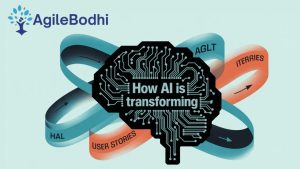In today’s rapidly evolving digital ecosystem, Agile coaching is undergoing a transformative shift—one that is being significantly accelerated by Artificial Intelligence (AI). Once a practice focused heavily on human intuition, coaching conversations, and team dynamics, Agile coaching is now embracing intelligent automation, AI-powered tools, and data-driven insights to unlock new levels of performance.
In this blog, we explore how AI is transforming Agile coaching, the benefits and challenges of this integration, and what it means for Agile professionals aiming to future-proof their roles.
The Evolution of Agile Coaching
Traditionally, Agile coaches help teams adopt Agile values and frameworks like Scrum, Kanban, or SAFe by facilitating retrospectives, mentoring Scrum Masters, removing impediments, and championing continuous improvement. However, as organizations scale Agile across departments and continents, manual coaching methods often become bottlenecks.
Enter AI in Agile coaching—a game changer for enabling data-informed decision-making, streamlining operations, and personalizing learning experiences at scale.

1. Data-Driven Decision Making with AI
One of the biggest challenges for Agile coaches has always been obtaining unbiased, real-time feedback on team performance, collaboration, and sprint quality. AI tools for Agile teams are now addressing this head-on.
Using machine learning algorithms, AI tools analyze sprint data, burndown charts, code commits, and even chat conversations to provide actionable insights. For instance:
– Predictive analytics can identify delivery risks before they escalate.
– Sentiment analysis helps assess team morale and communication patterns.
– Automated reports can track team velocity, cycle time, and WIP trends effortlessly.
These insights empower Agile coaches to focus less on data collection and more on guiding team evolution.
2. AI-Powered Retrospectives
Retrospectives are a cornerstone of Agile improvement—but when done repeatedly without evolution, they become routine. AI brings a refreshing shift here.
AI-powered retrospectives can now:
– Recommend areas for reflection based on performance trends.
– Suggest retrospective formats based on team dynamics.
– Track outcomes from previous retros and prompt follow-ups.
Digital tools like TeamRetro and Parabol are already integrating AI in Scrum ceremonies to make these reflections smarter, more engaging, and outcome-driven.
3. Digital Coaching Assistants
Imagine having a virtual Agile coach available 24/7 to answer team queries, guide through Agile practices, or even nudge team members to update user stories. That’s the power of AI-driven coaching assistants.
These AI bots can:
– Help onboard new Scrum Masters or Product Owners
– Recommend backlog refinement techniques
– Offer real-time suggestions during sprint planning or demos
This doesn’t replace human coaching—but rather augments it, giving coaches more time to focus on strategic interventions rather than operational hand-holding.
4. Automating Administrative Overload
Agile coaches often spend considerable time on:
– Scheduling ceremonies
– Setting up sprint boards
– Documenting coaching outcomes
With AI automation, these repetitive tasks can be managed by intelligent bots and integrations. Tools like Trello, Jira, and ClickUp already support AI-powered plugins that suggest task prioritization, flag bottlenecks, and automatically update statuses.
This administrative relief allows Agile coaches to focus on the human aspects of transformation—culture, behavior, and leadership.
5. Personalized Learning for Agile Teams
No two Agile teams are alike, and coaching can’t be one-size-fits-all. AI enables hyper-personalization of learning paths based on:
– Past project challenges
– Skill assessments
– Real-time collaboration patterns
For example, an AI system can suggest articles, videos, or microlearning content tailored to a team struggling with estimation or cross-functional collaboration. This just-in-time learning boosts adoption and retention of Agile practices.
6. Real-World Use Case: AI in Agile at Scale
A global software company recently adopted an AI tool to support its 200+ Scrum teams. The system analyzed Jira sprint data and identified which teams needed coaching intervention. Over six months:
– Delivery delays dropped by 30%
– Coaching resources were optimized by 40%
– Engagement scores improved by 18%
This case shows how AI in Agile transformation doesn’t just enhance productivity—it also makes coaching more strategic and impactful.

Challenges in AI-Driven Agile Coaching
Of course, AI is not without its limitations. Agile coaches must remain mindful of:
– Data privacy concerns (especially in retrospectives or HR-sensitive issues)
– Over-reliance on AI suggestions without human validation
– Team resistance to AI tools due to fear of surveillance
– Tool fatigue in already overloaded tech stacks
The key is to use AI as a coach’s assistant, not a replacement.
What’s Next? The Future of Agile Coaching with AI
Looking ahead, we foresee the rise of:
– Generative AI tools that can design sprint plans or OKRs
– Emotion recognition tools in retrospectives and 1:1 sessions
– AI-augmented reality (AR) coaching sessions for remote teams
– Coach dashboards showing not just KPIs but team psychology
Agile coaches who embrace these trends will be better equipped to lead complex, enterprise-level transformations.
Final Thoughts
AI is transforming Agile coaching—not by replacing the coach, but by empowering them with insights, automation, and intelligent support. For organizations, this means faster, more consistent Agile maturity. For coaches, it means evolving into data-savvy transformation leaders.
Are you ready to explore how AI can elevate your Agile coaching?
? Reach out to us for tools, training, and workshops on AI-Agile integration.
